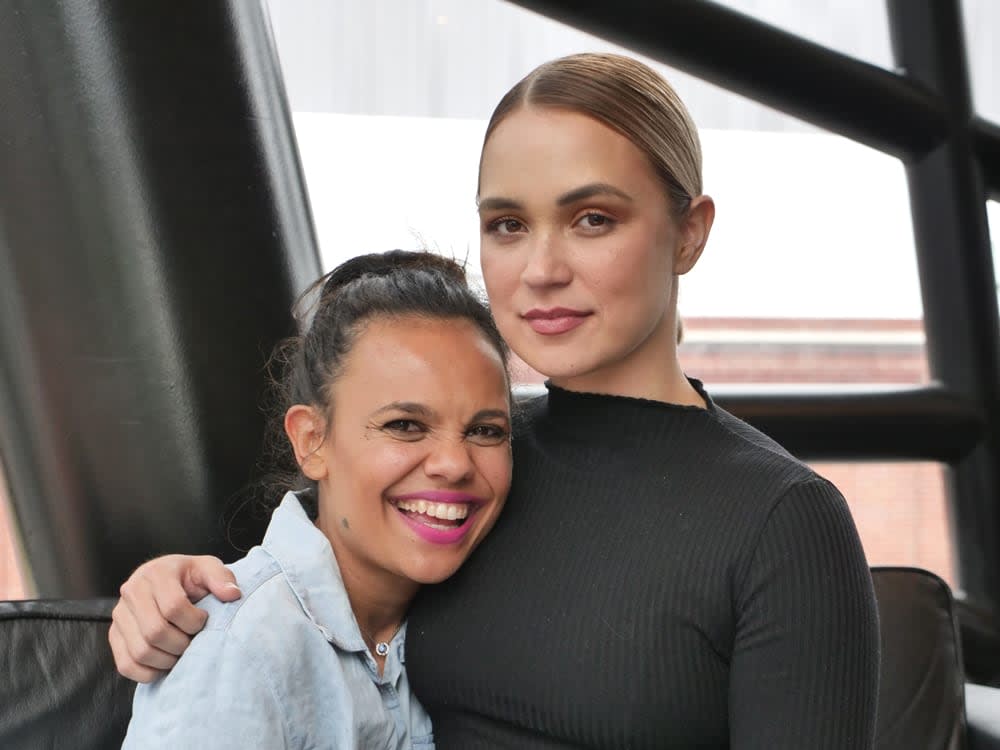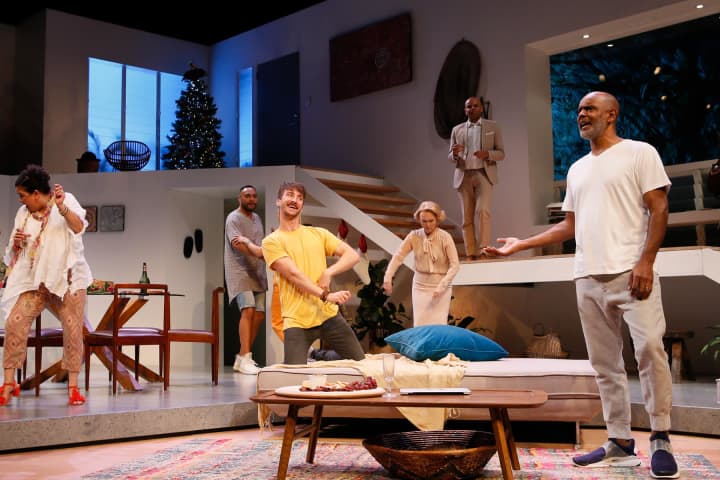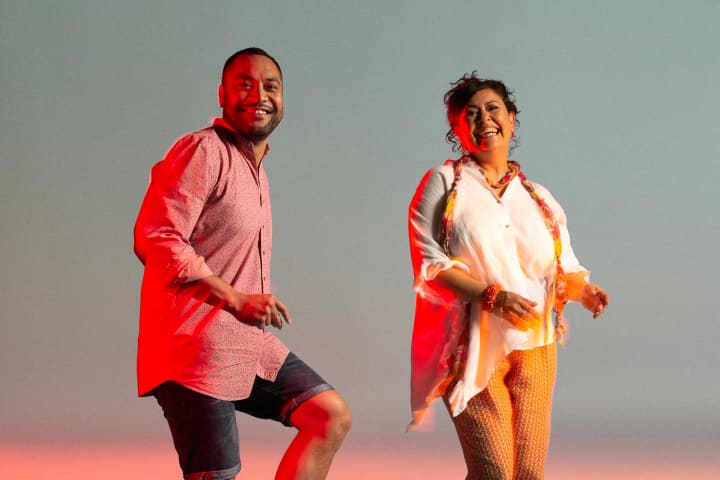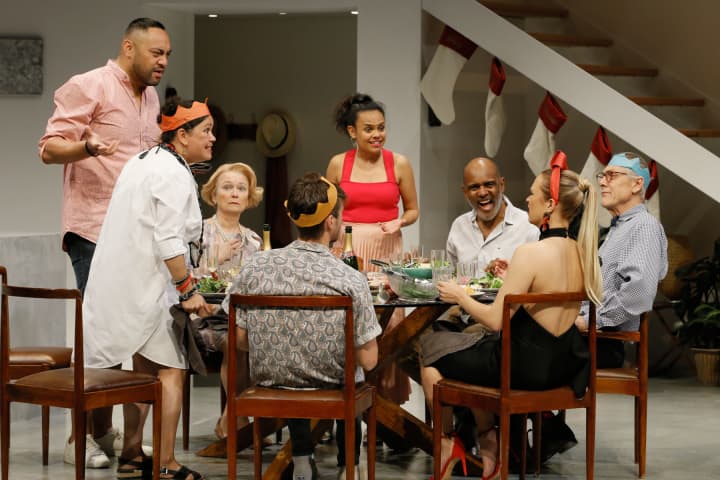Over coffee in the Qatar Airways MTC Lounge, we sat down with actors Miranda Tapsell and Tuuli Narkle to talk about their individual journeys in Black is the New White.
Before starring as Charlotte Gibson, Miranda Tapsell played her sister, Rose, in Sydney’s return season of the play. ‘It was a bit weird at first [switching principal parts],’ she says. ‘I caught myself saying Rose’s lines while rehearsing – I had such strong muscle memory of that part.’ For Tuuli Narkle, taking on the of Rose was ‘bloody intimidating’, but having Tapsell to look up to was the ultimate gift.
Narkle learnt the part in just four days before first performing in front of an audience at the Melbourne preview. ‘You don’t want to be the spanner in the works that throws the whole thing off,’ she notes. ‘It was utterly terrifying.’ But her fears soon dissipated with the support of the touring cast. ‘Everybody had my back. I knew if I did something wrong, heaven forbid, they’d be there to help me out. Stepping onto that stage, it felt like family … like the most natural thing on earth.’
Representation matters
As a recent graduate of NIDA, Narkle is still discovering what kind of artist she’d like to become. Having role models like Tapsell, who trailblazed a path before her, is ‘everything’, she says. ‘Seeing representation is the most incredible thing. I saw Miranda and Shari Sebbens do The Sapphires when I was in high school. I just remember watching it and thinking, “It’s a story about my people and about me.” In my opinion [Aboriginal culture] isn’t represented in Australian media and entertainment enough. The weight of that, I’ve carried [it] on. Because I want to continue bringing these stories out and giving that sense of belonging to anybody else out there that wants to take it.’
Tapsell herself grappled with visibility and representation. ‘Growing up, it never felt like people could see or hear me. I’m a small Aboriginal woman… so I turned to performance because it felt like a way for people to notice me. I had a friend tell me once, “Miranda, when you go on stage, it’s like you’re 10-foot tall.” It was the best thing anyone’s ever said to me.’ At 4ft11, Tapsell’s infectious vitality and strength on (and off) stage makes this illusion believable.

Miranda Tapsell and Tuuli Narkle
Performing passions
Both Tapsell and Narkle found their passion for performing at a young age. Tapsell was a fanatical tapper (tap classes were the only dance classes on offer in Kakadu) and was always performing shows for her family. ‘I was a big show off with make-up, costumes, the works,’ she says. Narkle, meanwhile, was the recipient of a circus scholarship awarded to children from low socio-economic households in Freemantle. It was here that she caught the bug and went on to complete her schooling at the selective John Curtin College of the Arts.
Despite Tapsell’s numerous career successes – including two Gold Logies and screen credits such as Top End Wedding (which she co-wrote and executive produced), The Sapphires, Love Child, Redfern Now and Secret City – she still rarely comes across a work that hooks into her soul. Watching Black is the New White for the first time was like stumbling upon magic, she says. ‘I love rom-coms. But they’re all so mono-cultural. Seeing this, I just completely blissed out. My heart felt so full.’
Integral Conversations
Tapsell knows firsthand what a unique talent playwright Nakkiah Lui is. She and Lui are long-time friends and collaborators, and together they host the podcast Pretty for an Aboriginal. Tapsell says Lui’s talent is that she can couch goliath social topics in a living room dramedy, and still have people laughing from start to finish. ‘They’re hard conversations,’ Narkle adds. ‘Which is what makes Black is the New White such an incredible show.’
As an only child, Tapsell treasures playing out the warts-and-all sisterly dynamic with Narkle every night. ‘Charlotte is given the job of bringing everyone together at Christmas. Dealing with the hurt and resistance that comes with that and the push and pull of those changing dynamics is really fun to play.’ Narkle has a younger sister in real life, so playing Rose has echoed elements of her own family dynamic, she says. ‘The conversations around Aboriginality and identity and race, and how we want to carry those parts of ourselves throughout our lives, [are] an integral part of the conversations we have with each other.
‘It’s incredibly vulnerable for an Aboriginal person to just stand there in their Aboriginality and say, “I am so proud”,’ Narkle continues. ‘I think sometimes, because of Rose’s dogmatic views, she can be read as a villain. She may have some limited opinions and needs to question some parts of what she thinks. But all she’s really doing and saying is “I am absolutely proud of who I am.” And so for people to have an adverse reaction to that is really confronting for me. Saying those things, and giving those speeches, has become something that’s so connected to my gut and heart. I’m really grateful I get to stand up there and say – for any Indigenous person in the audience – “You know what? You never have to apologise for your Aboriginality, ever.”’
See Black is the New White at Southbank Theatre, The Sumner
Qatar Airways is an MTC Major Partner. Genovese is an MTC Production Partner (thanks for the coffee!)
Published on 28 October 2019




